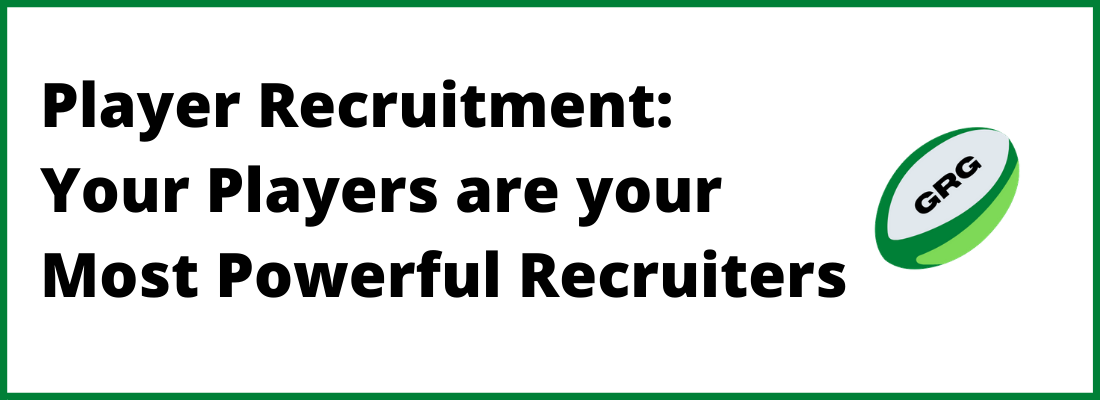One of the key drivers for establishing this blog was to try and achieve cut-through. That is to give you information that can help you out quickly and efficiently. When it comes to Player Recruitment, this post is it.
Your Players are your Most Powerful Recruiters.
If you do nothing else with Player Recruitment, then understand this concept and use it. I’ve seen it proven true time and time again in a variety of scenarios and if I was forced to pick only one method of recruiting players, this would be it. In this post, I want to explore some of the reasons why.
1 – Word of Mouth Marketing
One of the best forms of marketing remains word of mouth. The problem for marketers is that it is less in our control than, say, social media or email marketing. However, for a rugby team, word of mouth is very much within our control. Not only do we have access to the players regularly, but recruiting extra players is within their interest! After all, recruiting new players doesn’t just benefit the coach or the club administrator – it also benefits the players because they have a bigger and/or better squad. This means that you’ve got a much better chance of getting this word of mouth marketing done. Tell your players to think of any mates who would enjoy being part of the team and get your players to bring them along to a session. Once they’re there, make sure you’re welcoming!
2 – Customers have to Know Us, Like Us and Trust Us
One of the reasons word of mouth is so important is because the requirements for someone to become a customer is that they:
- Know Us
- Like Us
- Trust Us
Word of mouth marketing short circuits this process. Because players are talking to their friends, there’s already a level of know-like-trust in that friendship. The recommendation essentially allows the club to “borrow” the level of Like & Trust on a temporary basis. However, beware – you’ll have to live up to this promise. If your current players don’t have that level of trust in your club or team then they won’t recommend you to others. And if you fail to deliver to any friends they bring along, that’s going to have a negative impact both on the new player but also on the person who recommended them to try it out. But if you get it right, then a current player would be happy to recommend a friend to join.
3 – Target Audience
Finally, one of the key things we talk about when marketing is the idea of a target audience. If your team is full of the people who make up your target audience, then it stands to reason that they’re likely to be friends with people who are similar to them, and therefore likely part of your target audience as well. This means that not only will your product and your marketing (hopefully) already be tailored to them, but you’re also getting in front of people who are more likely to want what you’re offering.
How to make this into a system
Running an annual “bring a mate” session in pre-season would be an ideal way of applying this principle. If we wait until players decide to recommend us, it might never happen. Normally, this will just be because players don’t really think of it. But if there’s an annual event and players are encouraged to think of at least one person who might enjoy it then you’re much more likely to have your players carry it out.
I’ve seen it work especially well at recruitment events. One thing I saw and then started applying to my own events was incentivising recruitment by the players. At an Inner Warrior event I ran, I had a couple of England hoodies to give out. We did a competition that rewarded “raffle tickets” whenever a player did something to promote the event – something like 1 ticket for a share on social media that they tagged us in and 10 tickets if they directly brought someone along to the event. The competition definitely helped in terms of getting our content shared. It also led to six new participants attending the session which was higher than our target.

